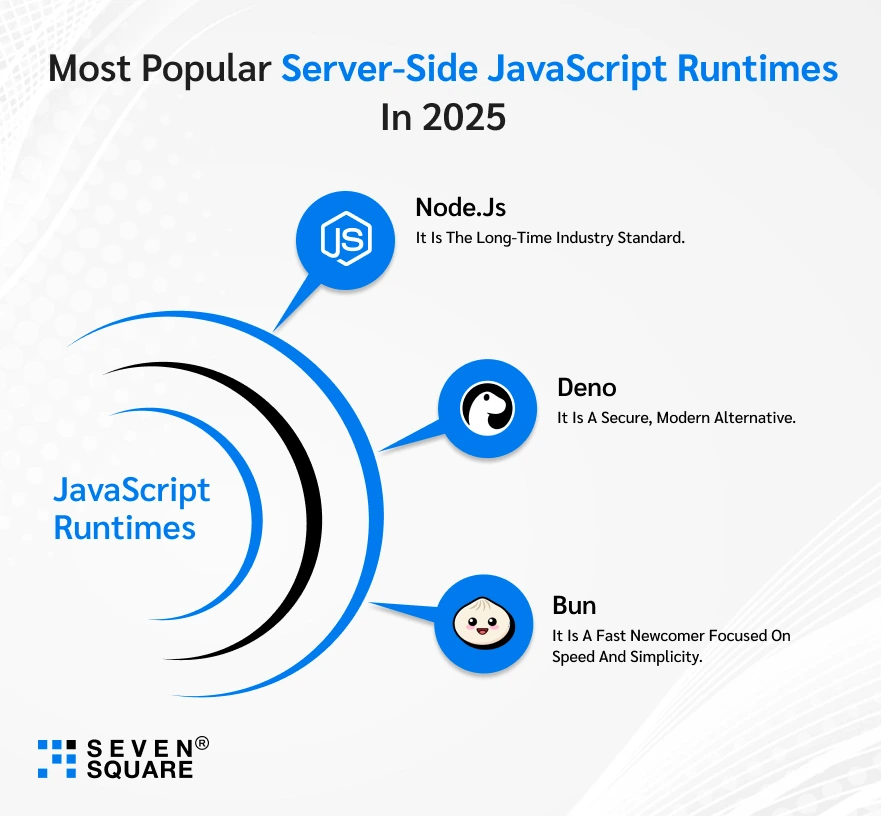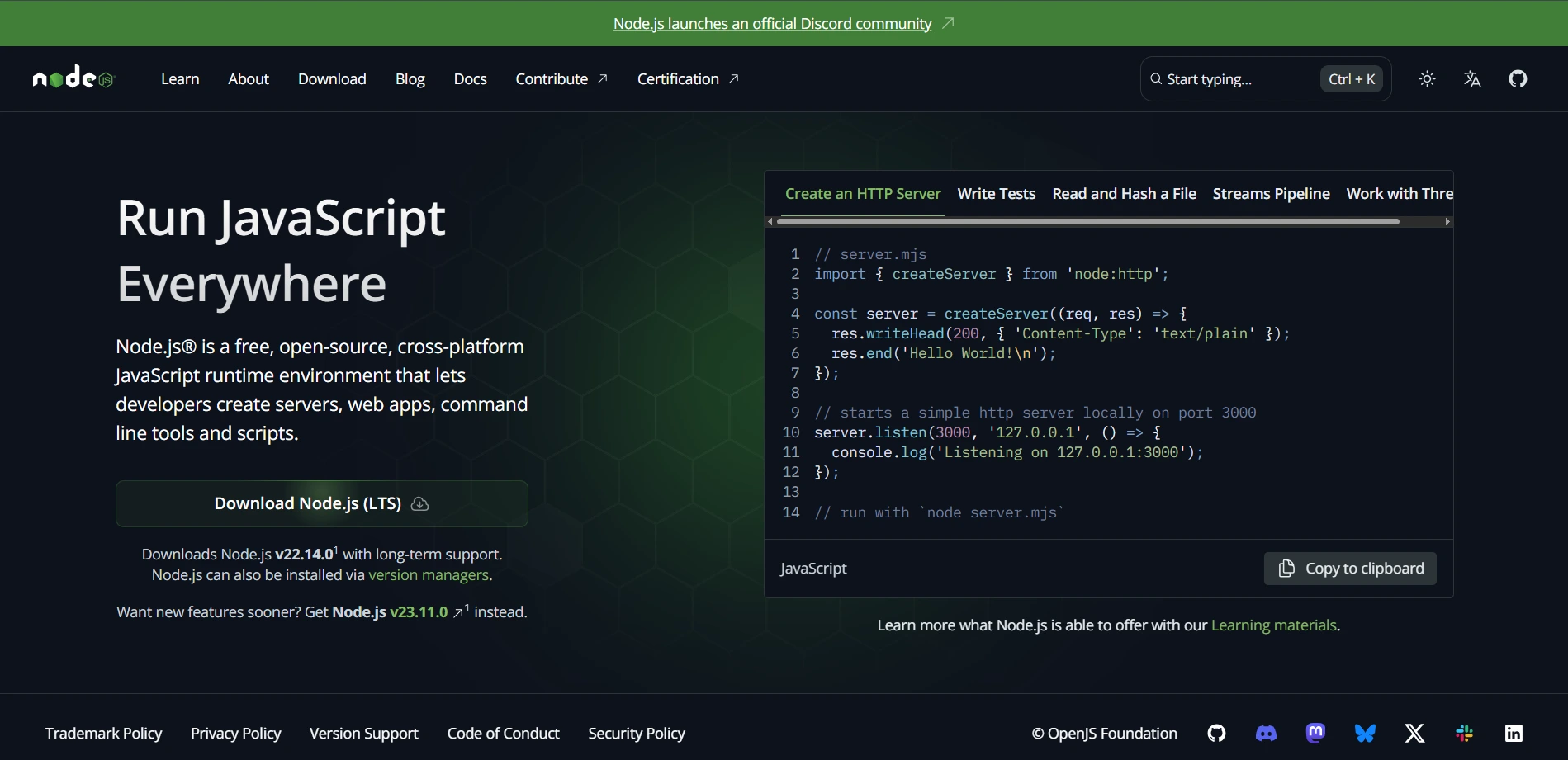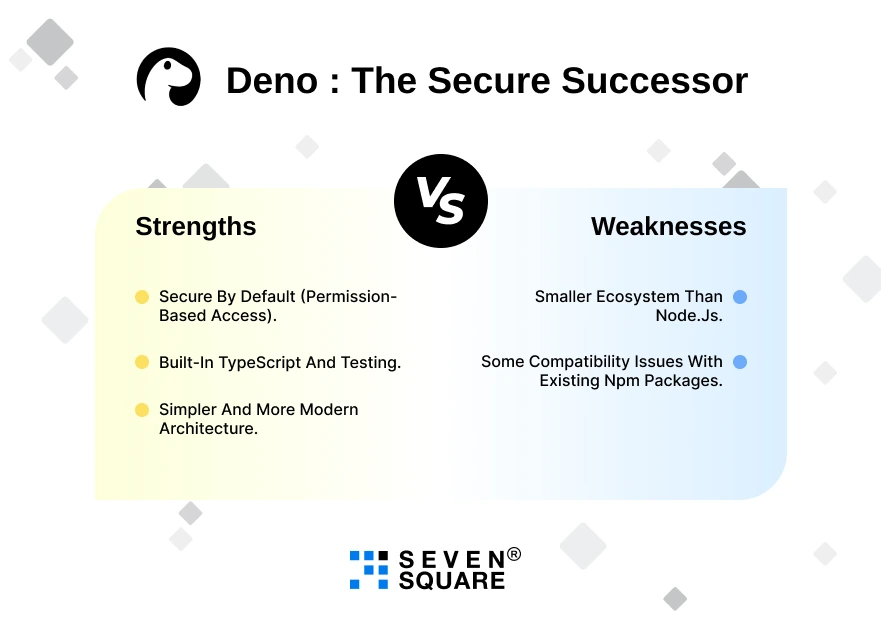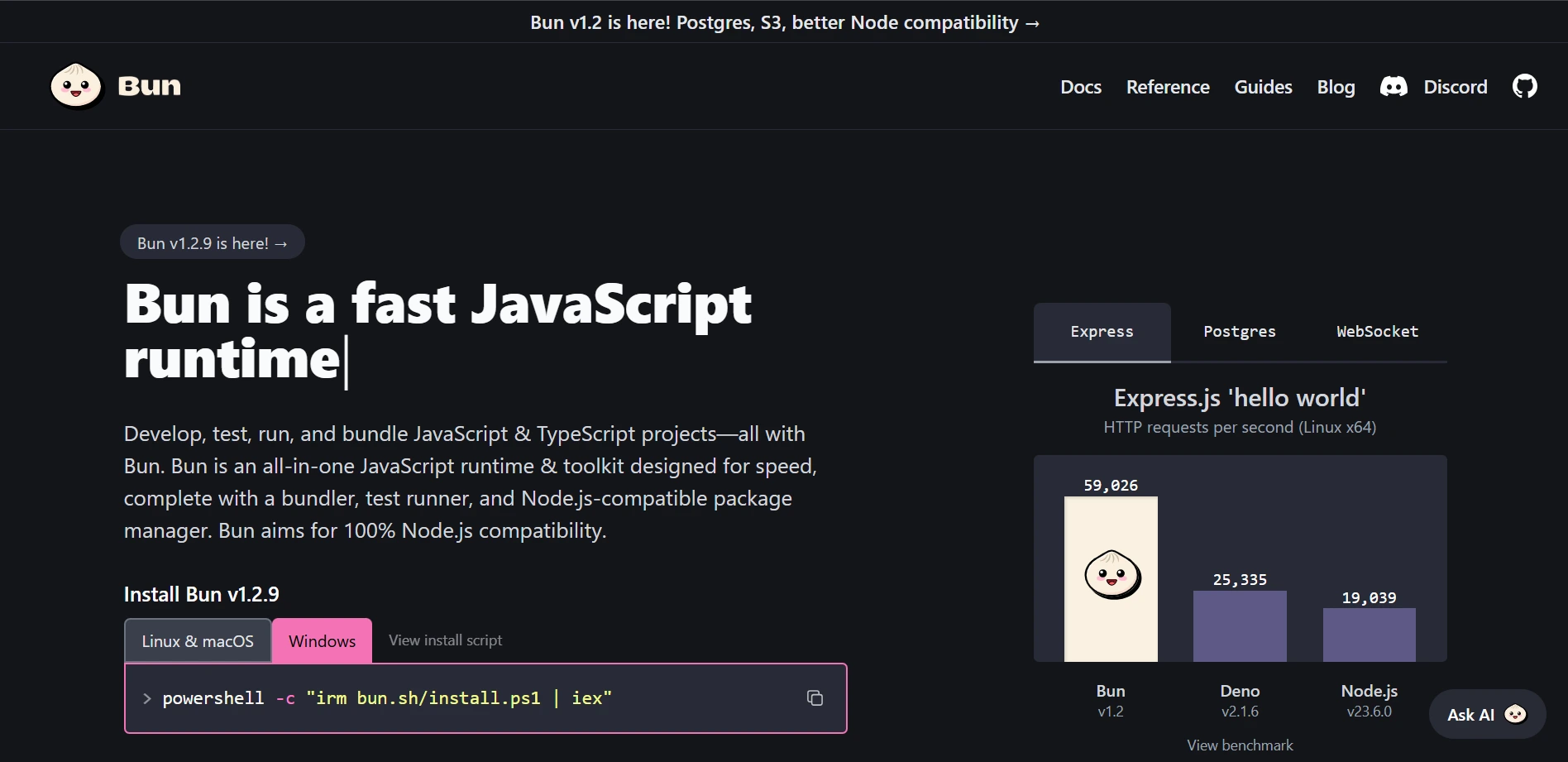The way we build web applications is changing fast and it comes to one big decision: Which JavaScript runtime should you use?
Whether you’re starting a new project or modernizing an old one, the runtime you choose can impact performance, scalability, and development speed.
The days are gone when Node.js was your only real option.
Today, we have powerful new players like Deno and Bun. Each has unique strengths but with many choices, it’s easy to feel overwhelmed.
That’s why in this blog you can learn about the JavaScript runtime comparison for 2025. You understand the pros and cons of Node.js vs Deno vs Bun.
Also explore the performance, security, TypeScript support, ecosystem maturity, etc. so you can use it to make the right call.
If you’re wondering which runtime is best for your next project then you’re in the right place.
What is a JavaScript Runtime?
Before we do the comparison of Node.js vs Deno vs Bun, let’s quickly understand what a JavaScript runtime is.
A JavaScript runtime is the engine that helps your JavaScript (or TypeScript) code run outside the browser.
Browsers like Chrome have built-in JavaScript engines (like V8) but you need a separate runtime to execute JavaScript on the server like to build APIs, real-time apps, or backend services.
These are known as server-side JavaScript runtimes, and they let you use JavaScript not just for frontend development, but for building full-stack applications.
Some of the most popular server-side JavaScript runtimes in 2025 are:

- Node.js: It is the long-time industry standard.
- Deno: It is a secure, modern alternative.
- Bun: It is a fast newcomer focused on speed and simplicity.
The Future of Sever-Side JavaScript: Node.js, Deno, or Bun?
JavaScript continues to dominate both frontend and backend development.
In 2025, three major players are leading the charge: Node.js, Deno, and Bun.
1. Node.js: The Veteran

Node.js has been the backbone of server-side JavaScript for a long time.
It made it possible to run JavaScript outside the browser and has helped everything from startups to tech giants like Netflix and PayPal.
If you’re working on a complex, production-ready app, Node.js has all the tools you need.
But in 2025, Node.js alternatives are gaining attention. Why?
Node.js lacks built-in TypeScript support and requires external tools for features like security and bundling.
This opens the door for modern runtimes that do more.
Strengths:
- Mature and widely adopted.
- Huge library ecosystem.
- Excellent community support.
Weaknesses:
- No built-in TypeScript.
- Manual configuration for security and bundling.
- Slower compared to newer runtimes.
2. Deno: The Secure Successor

Deno is a modern JavaScript runtime created by Ryan Dahl, the same developer who originally built Node.js.
Deno was designed to fix the design drawbacks he saw in Node, especially around security, simplicity, and modern development tools.
What makes Deno stand out? It comes with built-in TypeScript support, strong security defaults, and no need for separate package managers like npm as you can import modules directly via URLs.
Deno is getting popular among developers who want a clean, secure, and forward-thinking development experience.
Strengths:
- Secure by default (permission-based access).
- Built-in TypeScript and testing.
- Simpler and more modern architecture.
Weaknesses:
- Smaller ecosystem than Node.js.
- Some compatibility issues with existing npm packages.

3. Bun: The Speed Demon

Bun is the newest and it’s already turning heads.
Designed for performance, Bun is a JavaScript runtime that combines a bundler, transpiler, task runner, and package manager all in one tool.
It is built from the ground up in Zig (a low-level programming language) & Bun is incredibly fast and often beats Node.js and Deno in benchmarks.
It also supports many Node.js APIs & makes it easier to migrate projects.
Bun is ideal for developers who want quick builds, simple tooling, and fewer dependencies.
Strengths:
- Lightning-fast performance.
- All-in-one toolkit: bundler, transpiler, test runner.
- Partial support for Node.js packages.
Weaknesses:
- Still improving and not as battle-tested.
- Smaller community and ecosystem.
These three runtimes Node.js, Deno, and Bun are changing the future of JavaScript in 2025.
Speed Test: Node.Js vs Deno vs Bun Performance Comparison
When it comes to building fast & scalable applications, performance is everything.
We will explain how Node.js, Deno, and Bun go against each other using real-world benchmarks and request-per-second (RPS) metrics.
If you’re looking for a JavaScript runtime performance comparison, here’s what the latest tests show:
| Runtime | Request/sec (Hello World API) |
Cold Start Time | Memory Usage |
|---|---|---|---|
| Bun | 75,000+ | Very Fast | Low |
| Node.Js | 35,000 | Moderate | Moderate |
| Deno | 25,000 | Slightly Slower | Low |
Bun vs Node.js Performance Comparison
Bun outperforms Node.js in speed by more than double in some cases. Why?
- Bun is written in a low-level language called Zig which makes it very efficient.
- It combines a bundler, transpiler, and runtime into one to reduce overhead.
- Bun can handle more concurrent connections with lower latency.
On the other hand, Node.js is still solid and stable, but it has more layers (like external tools for bundling and transpiling), which can slow things down.
Real-World Use Cases
- Bun is perfect for high-performance APIs, serverless functions, and apps where speed is important.
- Node.js remains great for large-scale apps, especially where ecosystem support and long-term stability matter.
- Deno is one of the best middle ground. It is great for secure apps with modern development needs.
Node.js vs Bun vs Deno: Detailed JavaScript Runtime Comparison (2025)
If you’re trying to choose the right runtime for your next project.
This JavaScript runtime comparison 2025 will help you to select the best for your project.
Here’s a side-by-side comparison of Node.js vs Bun vs Deno based on performance, features, ecosystem, and more.
| Features | Node.js | Deno | Bun |
|---|---|---|---|
| Released | 2009 | 2020 | 2022 |
| Language | JavaScript (JS) | JavaScript & TypeScript (TS) | JavaScript & TypeScript |
| Built With | C++ | Rust | Zig |
| TypeScript Support | Requires external tools | Built-in | Built-in |
| Security Model | No default sandboxing | Secure by default (permissions-based) | Secure with better isolation |
| Performance | Good (stable & reliable) | Moderate | Fastest (high RPS, low latency) |
| Bundler & Transpiler | Requires external tools like Webpack, Babel | Not included | All-in-one (built-in bundler, transpiler, test runner) |
| Package Management | npm (largest ecosystem) | URL imports, Deno.land | Bun.pm + npm compatible |
| Community Support | Huge & mature | Growing | Still small but rapidly expanding |
| Compatibility with npm | Full | Partial | High (still improving) |
| Best Use Cases | Large-scale apps, production-ready systems | Secure apps, modern web tools | Speed-critical apps, microservices, serverless |
| Learning Curve | Familiar for most developers. | Moderate (new concepts) | Beginner-friendly |
- Node.js is the trusted workhorse with the largest ecosystem. If you’re looking for stability, community support, and compatibility, it’s still a strong pick.
- Deno is the modern and secure alternative that is perfect for developers who care about built-in TypeScript and safer apps.
- Bun is fast and ideal for performance-driven apps. It combines everything you need in one tool, which means fewer dependencies and faster dev workflows.
How We Can Help You Choose the Right JavaScript Runtime?
Choosing between Node.js, Deno, and Bun can be difficult because of performance, scalability, and long-term maintenance.
Learn about the best 5 JavaScript frameworks for front-end development.
We have a team of experts who help businesses and startups:
- Audit your current tech stack to assess if a new runtime is worth the switch.
- Consult on architecture decisions that match your product roadmap.
- Build high-performance applications using the right runtime for your needs (Node.js, Deno, or Bun).
- Migrate legacy Node.js apps to more modern alternatives like Deno or Bun.
- Optimize server-side performance through efficient runtime implementation.
Let’s future-proof your backend. Contact Us Today!
Node.Js, Deno, or Bun: What Should You Use and When?
Choosing the right JavaScript runtime can have a big impact on your project’s performance, development speed, and security.
Let’s see when to use each:
1. Use Node.js If You Need:
- A stable and proven solution trusted by millions of developers.
- Access to the largest package ecosystem (npm).
- Support for complex, enterprise-level applications.
- A strong community and long-term maintenance.
Best for:
- Large-scale web apps.
- Real-time apps (like chats or games).
- Backend APIs with complex logic.
- Companies that need tried-and-tested tools.
2. Use Deno If You Need:
- A secure-by-default runtime with built-in permission control.
- Native TypeScript support without extra config.
- A modern development experience with a cleaner standard library.
Best for:
- Security-first applications.
- Modern CLI tools.
- Lightweight APIs.
- Developer tools and scripting.
If you’re building a modern, secure tool with TypeScript then Deno is an excellent fit.
3. Use Bun If You Need:
- Maximum speed and performance.
- A single tool that can handle bundling, transpiling, and testing.
- Fast serverless functions or microservices.
Best for:
- High-performance APIs.
- Serverless architectures.
- Developer tools with fast builds.
- Startups need speed and agility.
In performance, Bun is better than both Node.js and Deno which makes it ideal for speed-sensitive projects.
FAQs
- Use Node.js for stability and a large ecosystem, Deno for built-in security and TypeScript, and Bun if you need top-tier performance and all-in-one tooling.
- Each has strengths based on your project type.
- Yes, Bun is mostly compatible with npm packages which makes it easier for developers to migrate existing Node.js projects & reuse familiar libraries.
- Yes, Deno has native TypeScript support while Node.js requires additional tools like Babel or TypeScript compilers.
- If TypeScript is your go-to then Deno offers a better experience.
- Yes, but it depends on your app.
- Deno and Bun are strong Node.js alternatives in 2025 but you need to evaluate compatibility, tooling, and ecosystem needs before switching.
- Bun is a great choice for serverless apps because of its fast cold starts and lightweight architecture.
- Deno is also perfect with its secure & permission-based model.